MercoPress. South Atlantic News Agency
Latin America
-
Saturday, June 21st 2014 - 08:35 UTC
Bachelet proposes meeting of Mercosur and Pacific Alliance leaders

Chilean President Michelle Bachelet on Friday proposed a September gathering between officials and business leaders from Mercosur and the Pacific Alliance in hopes of creating a tie-up between the two Latin American trade groups.
-
Friday, June 20th 2014 - 06:50 UTC
Uruguay advances details of third oil and gas bid round Punta del Este basin
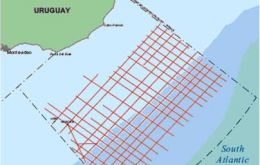
Uruguay has released a draft map of four ultra-deepwater and seven shallow-water blocks in the Punta del Este-Atlantic basin that will be on offer in the country’s third oil and gas bid round next year, officials said in Moscow this week, according to the oil and gas site Upstream.
-
Friday, June 20th 2014 - 06:34 UTC
Colombia-Brazil consider closer links between Pacific Alliance and Mercosur
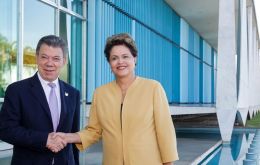
Colombia and Brazil's presidents Juan Manuel Santos and Dilma Rousseff met in Brasilia to address regional and bilateral affairs and the possibility of closer links between the Pacific Alliance and Mercosur, which “are naturally complementary and do not compete among themselves”.
-
Friday, June 20th 2014 - 06:19 UTC
Mujica delivers Obama message to Castro: 'let's talk about lifting the trade embargo”
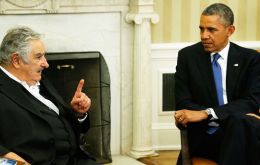
Uruguay's president Jose Mujica delivered a message from Barak Obama to Cuba's Raul Castro proposing the opening of dialogue to discuss the blockade, reported the Montevideo media on Thursday. The occasion was the recent G77 summit held in Bolivia.
-
Thursday, June 19th 2014 - 18:33 UTC
Argentina says June 30 bond service in New York was made 'impossible' by lifting 'stay' order

Payment of bond service due on June 30 in New York has been made “impossible” by Wednesday's lifting of a stay by a U.S. federal court, Argentina's economy ministry said on Wednesday, in a move that appeared to push the country closer to default.
-
Thursday, June 19th 2014 - 06:02 UTC
Brazil gives 85 hooligans 72 hours to leave the country or be deported

At least 85 hooligans mostly Chileans were given 72 hours to abandon Brazil following their arrests for having broken into the Maracaná stadium and destroyed most of the press centre. The incidents happened minutes before the Chile-Spain match in Rio do Janeiro on Wednesday when the South American team knocked out the reigning Cup kings.
-
Wednesday, June 18th 2014 - 23:04 UTC
Queen Elizabeth’s birthday celebrated in Uruguay

Her Majesty the Queen´s 88th birthday was celebrated at the British Embassy in Uruguay when Ambassador Ben Lyster- Binns and his wife Belinda hosted a reception for 300 invited guests.
-
Wednesday, June 18th 2014 - 08:31 UTC
Uruguay economy growing at a slower pace: imports up; exports stagnant
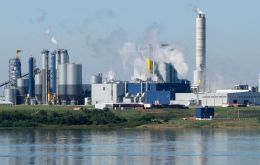
Uruguay's economy expanded 2.4% in the first quarter compared with the same 2013 period, but contracted 0.4% compared with the fourth quarter of last year, the central bank said this week. However deceleration is a fact since growth of the first quarter in 2013 has gone up 4.6% over 2012.
-
Tuesday, June 17th 2014 - 07:15 UTC
Argentina will pay 92% of restructured bonds, hopefully 100% of debt, but will not accept extortions
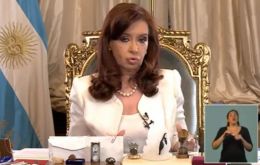
President Cristina Fernandez pledged on national television late Monday that Argentina will abide and honor its debts, the 92% of those who trusted in the country and hopefully the 100% of creditors, but will not accept 'extortions'.
-
Monday, June 16th 2014 - 07:22 UTC
OAS congratulates Santos and underlines the democratic process in Colombia
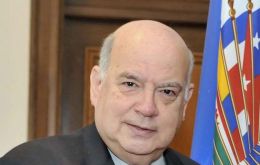
OAS Secretary General José Miguel Insulza, congratulated Colombian President Juan Manuel Santos for his re-election with an absolute majority of votes cast, which gives him a decisive popular mandate.
